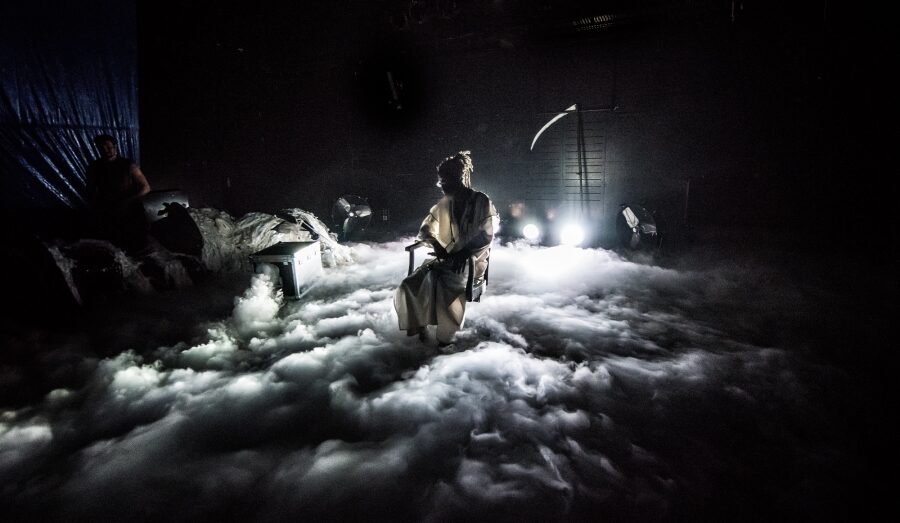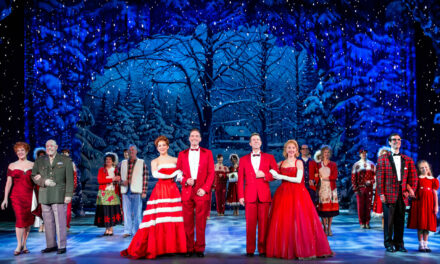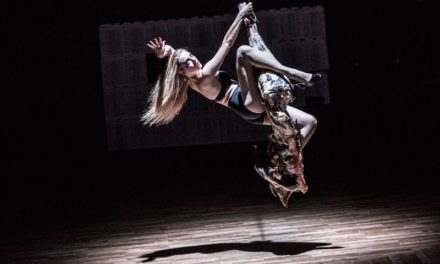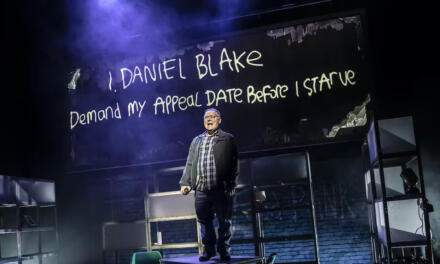In the virtual space of the 12th Between.Pomiędzy Festival of Literature and Theatre, a question is raised about the uncertain future of the non-virtual, physical world we live and breathe in, when breathing grows more and more difficult and fresh air may soon become a marketable commodity. It is the intriguing title of a spectacle on the fifth day of the Festival that prompts the question: How to save the world on a small stage? (Jak ocalić świat na małej scenie?). The production, created by Paweł Łysak and Paweł Sztarbowski, and directed by Łysak, premiered in November 2018 in Powszechny Theatre in Warsaw. The theatre, whose mission is to “get in the way” – in politics, social life or most intimate aspects of human life – now warns against the impending ecological catastrophe and asks about man’s responsibility for it. In this case, “man’s” rightly connotes “male,” since the authors of the production present the current environmental crisis as a result of the Promethean myth of human dominance over nature and belief in (scientific) progress long nourished within the patriarchal system and passed from fathers to sons.
Three parallel stories of fathers and sons form the core of the production, in which personal and intimate memories of family, childhood and growing up become intertwined with global and local concerns about the future of the planet. This future is near and foreseeable; as much as it is bleak, it is not yet absolutely determined, according to the authors and the reports they quote. The three narratives are based on reminiscences and verbal testimonies by Paweł Łysak, Artem Manuilov, and Mamadou Góo Bâ, who tell us about the lives of their families and especially their fathers: docent Jan Łysak, a Polish engineer who worked in Nigeria, where he created a utopian method of harvesting crops; Alexander Manuilov, a coal miner from the industrial Donbas region in Ukraine; and Demba Bâ, a ship engineer from Senegal working for a French trading company. Artem Manuilov and Mamadou Góo Bâ, actors and performers, tell their own stories on stage; the role of Paweł Łysak is played by Andrzej Kłak. In the eyes of their sons, the fathers appear first as heroes, visionaries, inventors, and true believers in progress, whom they perceive and describe with a mixture of love, fear, and reverence. The interwoven narratives start with episodes that all seem a secularized version of the ritual of initiation (a first skiing lesson in the Tatra Mountains, weightlifting followed by the first drink of vodka, and de-ritualized circumcision surgery), when the fathers teach their sons to overcome their fears and weaknesses. Yet, as the stories progress, the living conditions of the families as well as their social and natural environment decline. The ideals cherished by the progenitors turn out to be at best utopian, at worst a tool of political propaganda used to exonerate social injustice and exploitation of people and natural resources. The men, who seemed like superheroes to their adolescent sons, eventually succumb to penury and/or illness. For the three storytellers, growing up becomes synonymous with a growing awareness of the utopian nature of their fathers’ ideals when faced with the political and economic reality. However formative, that realization is both ironic and painful.
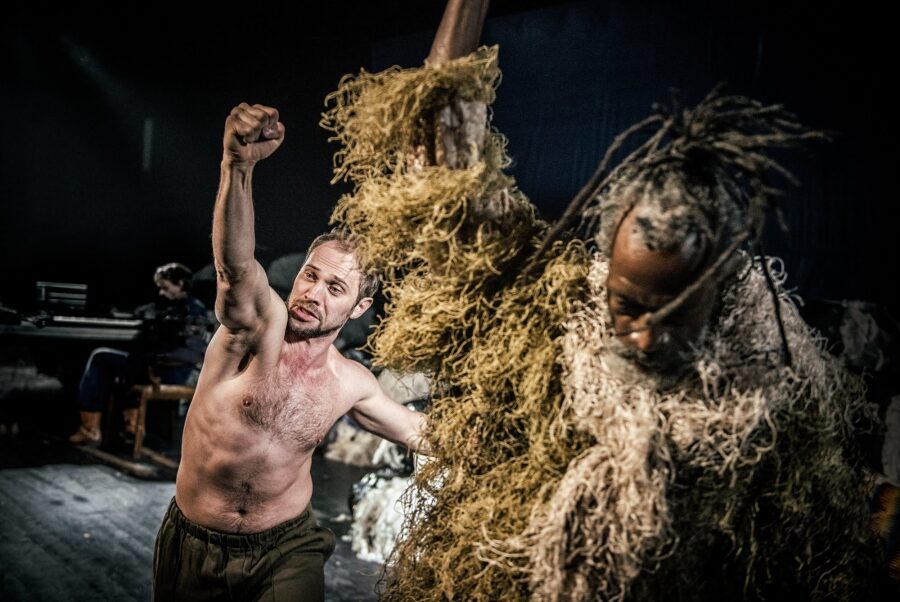
Artem Manuilov in Jak ocalić świat na małej scenie? (How to save the world on a small stage?). Photo: Magda Hueckel. © Teatr Powszechny in Warsaw.
While the erring fathers are presented with nostalgia and would probably command sympathy of the audience, at a more abstract level, their belief in progress and the patriarchal system they represent are vehemently accused as equivalent to human arrogance and a cause of exploitation and degradation of the natural environment and the present ecological crisis. The accusing finger is pointed at the audience by the only woman in the production, Anna Ilczuk, who plays a number of roles: Mephistopheles, herself, and, briefly, the mother of the main character Paweł Łysak. As Mephistopheles, she mocks and teases the figure of Faust (Kazimierz Wysota), who plays with an Earth-shaped balloon in the middle of piles of waste paper and rubbish, dreaming of greatness and dominion. The opening dialogue between Faust and Mephistopheles provides a frame, in which the three narratives are set, and a perspective, from which to look at the fathers’ dreams of progress.
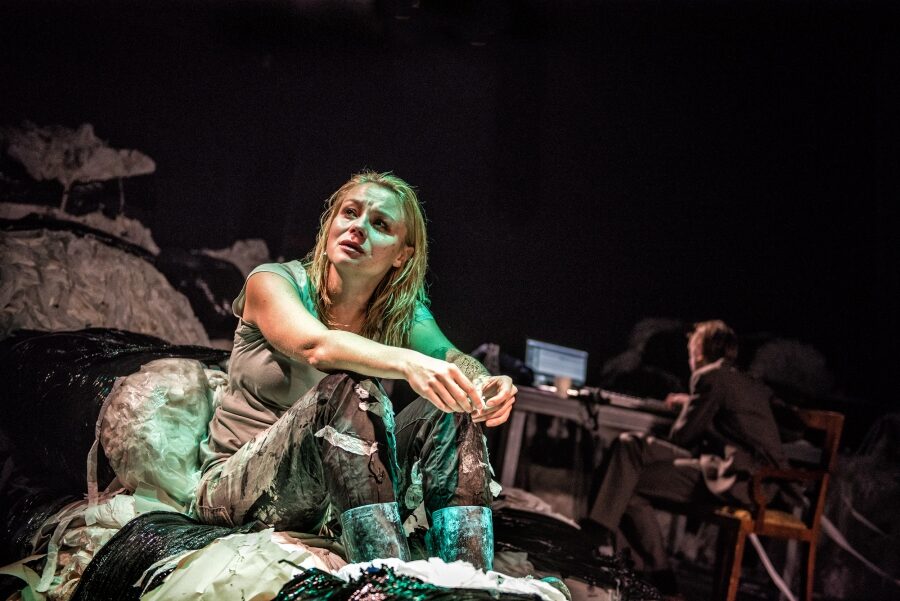
Anna Ilczuk in Jak ocalić świat na małej scenie? (How to save the world on a small stage?). Photo: Magda Hueckel. © Teatr Powszechny in Warsaw.
As for herself, the mother of a six-year-old daughter aware of the impending catastrophe, Anna Ilczuk teases the audience. She bombards us with the alarming data of environmental reports, and in a patronizing tone challenges spectators to solve a math puzzle about a bacteria colony, which serves as an illustration of her persuasion. She hectors about the shortsightedness and idiocy of Western civilization, despairing of the uncertain future of her daughter and her generation, and asks another loaded question: “What went wrong?”
If that question seems to be indirectly answered by the three narratives and the invocation of the Faust character, the original and more urgent eponymous question: “How to save the world?” remains, hovering at the end of the spectacle as the Earth-balloon from the opening scene. Notably, in 2021 the question, as well as the implied solutions, would probably resonate very differently than in 2018, the year of the premiere. Ilczuk’s sarcastic and angry tirade against the self-congratulatory enthusiasm of Western civilization (which very much resembles Byron’s ironic, mock-puzzlement about “opposite discoveries” and “wondrous new machines” of “the patent-age of new inventions” in Don Juan) might be perceived as justified censure of the paradoxes, inconsistencies, and shortsightedness of the Promethean and positivist aspirations of humankind. Yet it seems more difficult to censure the paradoxical and often self-destructive achievements of Western science and civilization. At the moment, it can legitimately congratulate itself on its prompt and, as it seems so far, efficient attempt to cope with the pandemic crisis. The 2021 Prometheus who, instead of fire, a lump of coal or a utopian method of harvesting, brings to humanity a life-saving vaccine cannot easily be dismissed, however much that Prometheus might be implicated in the corrupted mechanisms of the market. That is, unless one is an eco-extremist believing that the potential extinction of humanity would do good to the planet, as you could read in some popular Internet memes at the pandemic’s outbreak.
All this means that the relationship between the environment, humanity, and humanity’s ideals and dreams of progress is much more complex than the life of a colony of bacteria on a test glass, an example that is supposed to persuade me of the silliness and imprudence of mankind. I am better persuaded when Anna Ilczuk speaks about buying an air purifier to help her daughter breathe cleaner air, but suddenly realizes how much energy they use and the carbon footprint of such a gimmick. This example suggests that the authors of the production are aware that the solution is beyond any effort of the individual who, when left alone with the problem, must inevitably dabble in paradoxes. If they point an accusing finger at me, this is probably to make me aware I must be part of a more complex process that requires an awareness of common cause and a sense of common experience. This sense is, again, very much redefined and emphasized in 2020-2021.
Neither the patriarchal voice of father-Faust-Prometheus painting visions of strength, greatness, and dominance, nor the angry voice of an eco-activist mother can really answer the eponymous question of the spectacle: “How to save the world?”. They are both agonistic and patronizing, tainted with individualism and the air of presumptuousness. It is the third voice that seems to be closest to an answer, though it does not seem to be involved in the dialogue with the other two. This is the voice that is rooted in the intimate personal life of a family but speaks of growing awareness of community and shared experience. It can be heard in the choral singing of an old Polish folksong by two actors, one Ukrainian and the other Senegalese, who join their voices in a lament on the imminent catastrophe. It is also an urge to take joint responsibility for the world. Relegated to virtual space, the implicit call of the artists to join in the chorus, to share the experience of the living world and hear its appeal sounds especially urgent and poignant.
This post was written by the author in their personal capacity.The opinions expressed in this article are the author’s own and do not reflect the view of The Theatre Times, their staff or collaborators.
This post was written by Klaudia Łączyńska.
The views expressed here belong to the author and do not necessarily reflect our views and opinions.

